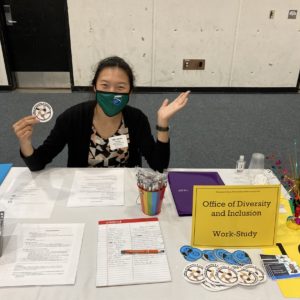By Miranda Orcutt – AmeriCorps member at Champlain College, Office of Diversity and Inclusion
Reflecting on a Year of Service: Some Thoughts and Advice

 The week this blog post goes live, it will be just about a year since I applied for my current AmeriCorps position. In July 2021, I had recently sat down in my supervisor’s office and broken down while I submitted my resignation for a job that physically and mentally drained me and pushed my tolerance level over the edge. When I applied for this AmeriCorps role, I was scrambling to train others who would cover me after I left the department and mentally preparing myself for backlash once everyone knew I was leaving. When I announced the news of my resignation, people had positive and negative responses–some understanding, some not so understanding.
The week this blog post goes live, it will be just about a year since I applied for my current AmeriCorps position. In July 2021, I had recently sat down in my supervisor’s office and broken down while I submitted my resignation for a job that physically and mentally drained me and pushed my tolerance level over the edge. When I applied for this AmeriCorps role, I was scrambling to train others who would cover me after I left the department and mentally preparing myself for backlash once everyone knew I was leaving. When I announced the news of my resignation, people had positive and negative responses–some understanding, some not so understanding.
If you are considering an AmeriCorps position, you may face a mixed bag of responses from people around you. In reflecting on advice I would give someone considering an AmeriCorps service year, one thing I would remind you is that everyone is on their own journey, and everyone may not agree with the pace or trajectory of your life. How much you value others’ opinions and expectations, as well as the standards and promises you’ve set for yourself, will affect how willing you might be to take on a service year.
Take time to reflect.
Do some soul-searching! Sit down and reflect on your own priorities and what you are looking for in the next chapter of your life. I wanted this AmeriCorps position because I wanted to explore working in a new setting (higher education, Student Affairs) and do direct Diversity, Equity, and Inclusion (DEI) work. I recognized from the lack of capacity building in my former job that I wanted to pursue more sustainable efforts, and I wanted to engage with and rediscover my local community. I also missed working with younger people, so I was excited to interact with and support students.
Consider the logistics of serving.
Service years are a convenient way to try something new for a predetermined amount of time. You should note the difference between types of AmeriCorps service years; some programs focus more on capacity building (e.g., VISTA) while others involve more direct service (e.g., NCCC). In addition to soul-searching, you should educate yourself on the AmeriCorps benefits and logistics of serving. For example, what is the housing situation like in the area you’re considering, and do you think you could afford a year where you will most likely not save any money?
service years; some programs focus more on capacity building (e.g., VISTA) while others involve more direct service (e.g., NCCC). In addition to soul-searching, you should educate yourself on the AmeriCorps benefits and logistics of serving. For example, what is the housing situation like in the area you’re considering, and do you think you could afford a year where you will most likely not save any money?
Know you are a federal employee.
Additionally, you should remember that as an AmeriCorps member, you are a federal employee. You are a representative, to a certain extent, of the federal government, and you must abide by the Hatch Act. During your service year, of course you will be affected by current events and personal obligations; you must reconcile your service with the parameters of your role and how it affects the rest of your life.
Set boundaries.
If you embark on a service year, set clear boundaries between your work and your non-work life, and clearly communicate those boundaries! This was probably the biggest challenge for me, and it has been a lifelong challenge. During my service year, I often took work home because I didn’t have enough time to finish my tasks during the day in the office. I would stay up late or wake up extra early to work on the office newsletter, prep materials for an event, or catch up on email (and schedule the responses so that people wouldn’t know I was working at midnight).
Something this service year has encouraged me to question is the type of job I want in the future and where (and how) I should draw the line between work and the rest of my life. I have grown up with two main messages: “Work is your necessary source of income and is your contribution to the capitalist society you live in,” and “Work should be your passion and fulfillment of your dreams; you should love what you do (because you’re going to be doing it for the rest of your life)!” Looking back on the past few jobs I have had now, I think having a job you
like on any level is a privilege, and if you have a job that you enjoy most of the time, that is incredible! The pressure to find a job that you absolutely love all the time is unrealistic and overstated. The expectation that you will find a single job and commit to that for the rest of your life ignores the reality of change and growth. I have found that it is vital for me to feel at least somewhat invested in my work but to resist letting myself become consumed by my work.
Be open. A lot can happen in a year.
My last piece of advice for anyone considering a service year is to be open to  meeting new people and seizing new opportunities. These are likely reasons you are interested in AmeriCorps in the first place. I probably would have laughed in disbelief if someone had told me back in August 2021 that come winter, I would be skating around in an inflatable unicorn costume on the school’s homemade outdoor ice rink. During your service year, you will inevitably face challenges, but you will also learn from your experiences, and you will accomplish and do things that you cannot imagine right now.
meeting new people and seizing new opportunities. These are likely reasons you are interested in AmeriCorps in the first place. I probably would have laughed in disbelief if someone had told me back in August 2021 that come winter, I would be skating around in an inflatable unicorn costume on the school’s homemade outdoor ice rink. During your service year, you will inevitably face challenges, but you will also learn from your experiences, and you will accomplish and do things that you cannot imagine right now.
What’s next (for me and you)?
I’ve thought about where I was a year ago; where will I be a year from now? I don’t know, and I am okay with that answer. As much as uncertainty fills me with angst, I try to challenge myself to not feel like I must know everything and to feel like I need to satisfy people with easy answers when they ask me about my future. I aim to find a certain peace with not knowing. There is not a single correct way to live life, and I hope your next steps are what feel right to you!
Miranda Orcutt (she/her) is the 2021-2022 AmeriCorps VISTA member serving in CCNH’s College Access and Success Program at Champlain College’s Office of Diversity and Inclusion. She enjoys spending time with family and friends, reading, hiking, and listening to podcasts.


